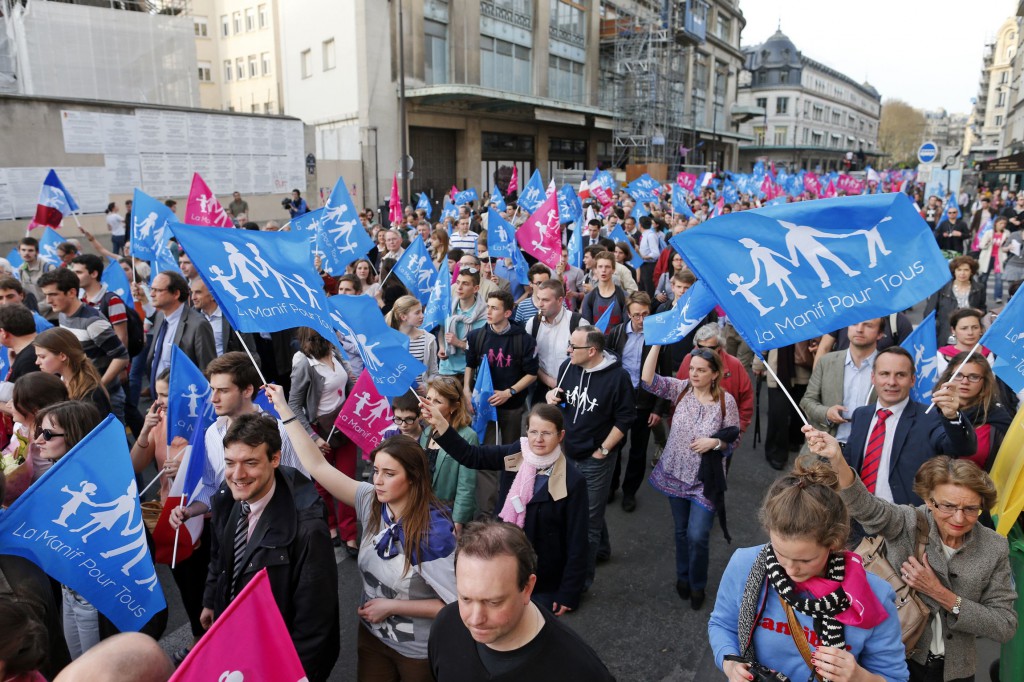
By Jonathan Luxmoore
A French Catholic campaigner urged church leaders not to give up opposition to same-sex marriage, despite the spread of laws allowing the practice across Europe.
“The message from France is the campaign isn’t over — these laws rely on a big lie, and no lie can survive,” said Antoine Renard, president of the Federation of Catholic Family Associations in Europe.
“Our own government has succeeded in its goal of dividing opinion in the Catholic Church, so the church’s authorities need to be prudent. But there’s a lot of teaching to be done, and I hope our pastors will provide it,” he told Catholic News Service June 7.
France’s same-sex marriage law, which allows gay and lesbian couples to marry and adopt children, was signed by French President Francois Hollande May 18.
Renard said Catholic groups would step up their campaign against the law before municipal and European Parliament elections in early 2014 and would try to block the government’s “gender-based reforms” in education and family life.
“Although this law has been adopted, we can still fight against its application and pressure political parties to show stronger commitment,” Renard said. “Although it will be difficult to repeal or revise it, we’re determined to try and will be encouraging campaigners in other countries to do the same.”
The Catholic La Croix daily said June 4 that France was seeing a “multiplication of initiatives” against the law, with new groups springing up nationwide.
The paper said one organization, Founding Tomorrow, had been set up by young professionals from various parties to combat “the failure of Christians to engage long-term in politics,” while another, Actors for the Future, had been formed by a priest from the church’s Versailles Diocese.
Renard said opponents of same-sex marriage would seek to invalidate the law by having marriage inscribed in France’s constitution as “the union of a man and woman.”
He added that lawyers also were checking whether the law violated France’s international commitments, including the 1989 U.N. Convention on the Rights of the Child, which enshrines a child’s rights “to know and be cared for by his or her parents.”
He said France’s constitutional council ruled that marriage can be modified by law, “so we can use this in our own fight.”
Same-sex marriage is also allowed in Belgium, Denmark, Iceland, the Netherlands, Norway, Portugal, Spain and Sweden, and legislation is under consideration in Britain.
Same-sex adoption is expected to become legal in traditionally Catholic Austria July 1, to comply with a February ruling by the European Court of Human Rights, while the highest constitutional court in Germany, where same-sex adoption is allowed, strengthened the fiscal rights of homosexuals June 6.
The French law has been bitterly opposed by the Catholic bishops’ conference, whose outgoing president, Cardinal Andre Vingt-Trois of Paris, told an April plenary at Lourdes that France was witnessing “an organized and militant invasion by gender theory.”
In a June 4 report, the French bishops’ family and society council said “radicalization” caused by the law had been felt “even within Catholic communities and those responsible for family pastoral work.”
“Some believe this reform doesn’t modify marriage at all, since it recognizes love between two beings, whereas others think it deprives marriage of its substance by making light of sexual difference,” the church report said.
“Some deny the church any right to intervene in questions facing society, whereas others want it to be the focus for a political struggle. Some invoke the merciful love of God to plead for the law, while others invoke God’s creative love to oppose it.”
Renard said his federation and other groups would “concentrate on raising awareness, and then on a program of renewal to change how political parties behave.”
“People around Europe have seen how unexpectedly strong the opposition to same-sex marriage has been in France. We’ll now try to capitalize on this and export our resistance to the rest of Europe,” he said. – CNS